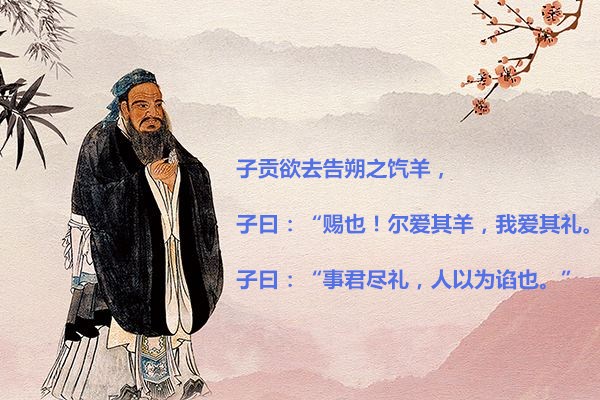Tsze-kung wished to do away with the offering of a sheep connected with the inauguration of the first day of each month.
子貢欲去告朔之餼羊,
The Master said, "Ts'ze, you love the sheep; I love the ceremony."
子曰:“賜也!爾愛(ài)其羊,我愛(ài)其禮。”
The Master said, "The full observance of the rules of propriety in serving one's prince is accounted by people to be flattery."
子曰:“事君盡禮,人以為諂也。”
The Duke Ting asked how a prince should employ his ministers, and how ministers should serve their prince.
定公問(wèn):“君使臣,臣事君,如之何?”
Confucius replied, "A prince should employ his minister according to according to the rules of propriety; ministers should serve their prince with faithfulness."
孔子對(duì)曰:“君使臣以禮,臣事君以忠。”

The Master said, "The Kwan Tsu is expressive of enjoyment without being licentious, and of grief without being hurtfully excessive."
子曰:“《關(guān)睢》,樂(lè)而不淫,哀而不傷。”
The Duke Ai asked Tsai Wo about the altars of the spirits of the land.
哀公問(wèn)社于宰我,
Tsai Wo replied, "The Hsia sovereign planted the pine tree about them; the men of the Yin planted the cypress;
宰我對(duì)曰:“夏后氏以松,殷人以柏,
and the men of the Chau planted the chestnut tree, meaning thereby to cause the people to be in awe."
周人以栗,曰使民戰(zhàn)栗。”
When the Master heard it, he said, "Things that are done, it is needless to speak about;
子聞之,曰:“成事不說(shuō),
things that have had their course, it is needless to remonstrate about; things that are past, it is needless to blame."
遂事不諫,既往不咎。”












